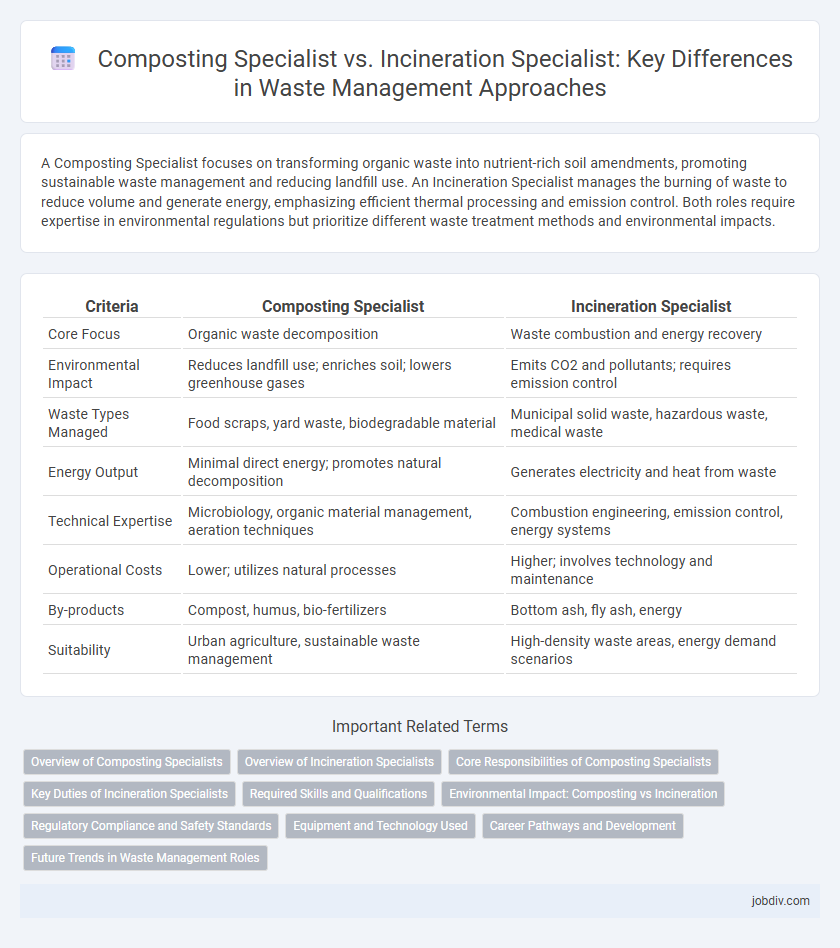A Composting Specialist focuses on transforming organic waste into nutrient-rich soil amendments, promoting sustainable waste management and reducing landfill use. An Incineration Specialist manages the burning of waste to reduce volume and generate energy, emphasizing efficient thermal processing and emission control. Both roles require expertise in environmental regulations but prioritize different waste treatment methods and environmental impacts.
Table of Comparison
| Criteria | Composting Specialist | Incineration Specialist |
|---|---|---|
| Core Focus | Organic waste decomposition | Waste combustion and energy recovery |
| Environmental Impact | Reduces landfill use; enriches soil; lowers greenhouse gases | Emits CO2 and pollutants; requires emission control |
| Waste Types Managed | Food scraps, yard waste, biodegradable material | Municipal solid waste, hazardous waste, medical waste |
| Energy Output | Minimal direct energy; promotes natural decomposition | Generates electricity and heat from waste |
| Technical Expertise | Microbiology, organic material management, aeration techniques | Combustion engineering, emission control, energy systems |
| Operational Costs | Lower; utilizes natural processes | Higher; involves technology and maintenance |
| By-products | Compost, humus, bio-fertilizers | Bottom ash, fly ash, energy |
| Suitability | Urban agriculture, sustainable waste management | High-density waste areas, energy demand scenarios |
Overview of Composting Specialists
Composting specialists focus on organic waste management through the biological decomposition of materials such as food scraps, yard waste, and agricultural residues to produce nutrient-rich compost. They possess expertise in maintaining optimal conditions for microbial activity, including aeration, moisture, temperature, and pH levels, to accelerate decomposition and minimize odors. Their role significantly contributes to reducing landfill waste, lowering greenhouse gas emissions, and improving soil health by recycling organic matter into sustainable fertilizer.
Overview of Incineration Specialists
Incineration specialists are experts in waste-to-energy technology, focusing on converting municipal solid waste into usable energy through controlled combustion processes. They manage emissions control systems to minimize environmental impact and ensure compliance with stringent air quality regulations. Their expertise includes optimizing furnace operations, ash handling, and implementing advanced pollution mitigation techniques to achieve sustainable waste management.
Core Responsibilities of Composting Specialists
Composting specialists manage organic waste by overseeing the biological process that converts food scraps, yard waste, and other biodegradable materials into nutrient-rich compost, emphasizing waste reduction and soil health enhancement. They design and maintain composting systems, monitor temperature and moisture levels, and ensure compliance with environmental regulations to optimize decomposition and minimize greenhouse gas emissions. Their role contrasts with incineration specialists who focus on waste combustion and energy recovery rather than organic recycling.
Key Duties of Incineration Specialists
Incineration specialists manage the combustion process to reduce waste volume and control emissions, ensuring compliance with environmental regulations. They monitor and maintain equipment such as furnaces and scrubbers, analyze waste feedstock composition, and optimize operational parameters to maximize energy recovery. Their expertise also includes handling hazardous waste safely and coordinating waste-to-energy conversion systems for sustainable waste management.
Required Skills and Qualifications
Composting specialists require expertise in organic waste management, soil science, and microbial activity, with qualifications often including degrees in environmental science, agriculture, or waste management, alongside certifications in composting techniques. Incineration specialists must possess knowledge of thermal treatment processes, emissions control, and regulatory compliance, typically holding engineering degrees in chemical or environmental engineering with experience in hazardous waste management and air quality standards. Both roles demand strong analytical skills, safety protocol adherence, and familiarity with environmental regulations to ensure sustainable waste disposal solutions.
Environmental Impact: Composting vs Incineration
Composting specialists prioritize organic waste decomposition, reducing methane emissions and enhancing soil health through nutrient-rich humus production. Incineration specialists focus on reducing waste volume via high-temperature combustion, which generates energy but emits greenhouse gases and potentially harmful pollutants. Environmental assessments highlight composting as a lower-impact method promoting carbon sequestration, while incineration involves trade-offs between waste reduction efficiency and air quality concerns.
Regulatory Compliance and Safety Standards
Composting specialists ensure adherence to environmental regulations such as the EPA's Composting Rule, maintaining strict controls on odor, pathogen reduction, and leachate management to minimize ecological impact. Incineration specialists comply with air quality standards set by the Clean Air Act and local emissions regulations, focusing on controlling toxic emissions, ash disposal, and worker safety protocols. Both roles require rigorous safety standards and thorough documentation to meet federal and state regulatory frameworks, safeguarding public health and environmental integrity.
Equipment and Technology Used
Composting specialists utilize advanced aerobic systems such as windrow turners, in-vessel composters, and biofilters to enhance organic waste decomposition while maintaining optimal moisture and airflow. Incineration specialists operate high-efficiency rotary kilns, fluidized bed combustors, and pollution control devices like electrostatic precipitators and scrubbers to manage waste combustion and emissions. The technology selection directly impacts environmental outcomes, with composting emphasizing biological processing equipment and incineration relying on thermal treatment and emission control technologies.
Career Pathways and Development
Composting specialists focus on organic waste management, developing expertise in soil science and environmental sustainability, often advancing through certifications in composting technologies and waste reduction strategies. Incineration specialists specialize in thermal treatment processes, gaining knowledge in emissions control, energy recovery, and regulatory compliance, with career growth linked to engineering credentials and environmental health training. Both pathways offer opportunities in government agencies, waste management firms, and environmental consulting, emphasizing different skill sets aligned with sustainable waste solutions and pollution mitigation.
Future Trends in Waste Management Roles
Composting specialists are increasingly in demand as sustainable waste management prioritizes organic recycling and soil regeneration, supported by technological advancements in anaerobic digestion and microbial processes. Incineration specialists remain crucial for waste-to-energy solutions, with future roles emphasizing emissions reduction technologies and compliance with stricter environmental regulations. Emerging trends indicate a hybrid approach where expertise in both organic waste composting and advanced thermal treatment will define the next generation of waste management professionals.
Composting Specialist vs Incineration Specialist Infographic

 jobdiv.com
jobdiv.com